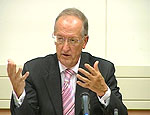UN suggests ISAF expands its support to countering narcotics

Antonio Costa, Executive Director UNODC
Antonio Maria Costa, Executive Director of the UN Office on Drugs and Crime (UNODC) visited NATO HQ on 3 September. He met with NATO Secretary General Jaap de Hoop Scheffer and briefed the North Atlantic Council on the UNODC’s Afghanistan Opium Survey 2008.
Mr. Costa reported a significant decline in the cultivation of opium in Afghanistan as well as an important increase in the number of provinces that are opium free. “A news that is good on its own merit. A news that is relatively good as we want to make sure that it lasts over time”, he stated.
In addition to the 26 NATO Ambassadors, representatives of Afghanistan, Partners contributing troops to the ISAF mission, and neighbouring countries to Afghanistan also attended the briefing.
The UNODC chief underscored the strong correlation between security and opium cultivation as well as the key role the NATO-led International Security Assistance Force (ISAF) can play in support of the Afghan government’s counter-narcotics efforts.
In particular, he suggested that ISAF considers expanding its support to include destroying heroin labs and interdicting drugs convoys, which would further mitigate the drug problem and improve the security situation. He also asked ISAF to focus on major traffickers, neutralizing or at least identifying them so that their movement can be disrupted.
Mr. Costa added “We need to militarily regain control of the remaining provinces so that illicit activities are limited”. In this regard, he asked ISAF to focus on western Nimroz province and the southern Zabul and Daykundi provinces where opium cultivation is relatively low and insurgency is not a major threat.
Finally, he stressed the importance of ISAF’s support to strengthening border security to help prevent the illegal trade.
Assisting the Afghan government in handling its counter-narcotics programmes is one of ISAF’s key supporting tasks. It includes sharing information, conducting efficient public information campaign and providing in-extremis support to the Afghan National Security Forces in charge of counter-narcotics operations.
